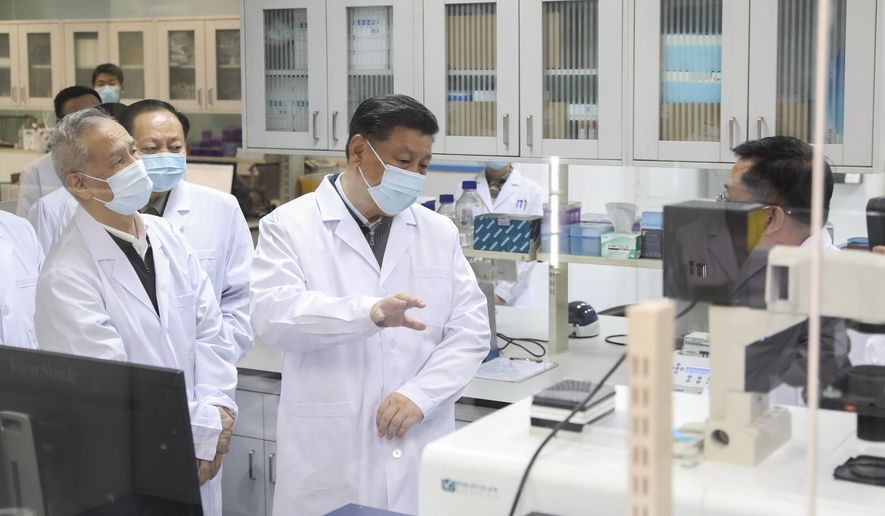Sen. Tom Cotton said today communist China paid “bribes” to Ethiopia when World Health Organization Director-General Tedros Adhanom was a cabinet minister there.
In 2017, the WHO spoke of a “strategic partnership” with China as Mr. Tedros prepared to travel to Beijing to cement ties as one of his first acts as new director-general.
Mr. Cotton, Arkansas Republican, is a fierce critic of Beijing for what he says is an unprecedented coverup of a health catastrophe that has killed thousands globally. He offered the Ethiopian history as a way to explain Mr. Tedros’ continued defense of China.
Republicans have accused Mr. Tedros of being a China “puppet” by repeating the communist party’s inaccurate coronavirus assessment in January, such as it was not spreading human-to-human when in fact it was. The director general also echoed Beijing’s opposition to travel bans to thwart the COVID-19 disease spread.
Many public health officials endorsed restrictions to stop travelers from seeding the virus in new areas. President Trump placed restrictions on people coming to the U.S. form China and Europe.
“The only way we can have confidence in the WHO in the short term is if Dr. Tedros leaves and his senior team leaves,” Mr. Cotton said on Fox News’ “Fox and Friends.” “He has a well established reputation for corruption going back to being a minister in Ethiopia when China was handing out bribes there as part of their ’Belt and Road’ initiative. And going back to the earliest days of this pandemic the WHO under his leadership seemed to prioritize political correctness and sucking up to China, not trying to focus on what their name calls for which is world health.”
Mr. Cotton said China’s original explanation that the virus leaked from a wild animal bushmeat market is not believable. He says there is “circumstantial evidence” the pathogen some how escaped from laboratory in Wuhan where scientists are researching the various coronaviruses carried by bats. The animal is sold in China’s network of “wet markets.”
“You can see how the Chinese communist party has continued to lie about this from the very beginning as if they have something to coverup,” said Mr. Cotton, a member of the Senate Select Committee on Intelligence. “If that is the case it really is the biggest, the costliest, the most deadly coverup in the history of mankind.”
Belt and Road is a pet project of Chinese President Xi Jinping. It involves Chinese firms moving into agreeable countries to supply workers and perform public works. Critics say it is, in effect, a Beijing expansionist operation to gain an economic and a political foothold and counter American influences.
Mr. Tedros is a microbiologist, not a physician. He served as health and foreign minister as a member of Ethiopia’s ruling leftist Tigray People’s Liberation Front, which ousted military rule over 20 years ago.
Mr. Tedros continued his association with Belt and Road as WHO director.
“Director-General leads WHO delegation to the Belt and Road Forum for Health Cooperation” said a WHO press release on Mr. Tedros’ plans to attend a B&R conference in Beijing Aug. 18-19, 2017.
“Mr. Tedros’ visit is to establish a new vision for WHO-China strategic partnership for the next 5–7 years,” the statement said.
Mr. Trump has cut off funding for WHO while his administration investigates how the organization handled the outbreak, which occurred in Wuhan in December and then spread via Chinese travelers to the U.S and Europe.
Dr. Michael Ryan, director of WHO’s emergency health program, was asked at a Wednesday press conference to address Mr. Trump’s complaint that the organization misled the world by reporting the virus was not contagious, following China’s lead.
Dr. Ryan said, “The virus was identified on January 7th, the sequence was shared, I think on 12th with the world. We were dealing with a completely new virus. All potential respiratory pathogens…in the initial reports in which there was no mention of human-to-human transmission it was clusters of –– a cluster of atypical pneumonia or pneumonia of unknown origin. There are literally millions and millions of cases of atypical pneumonia around the world every year and in the middle of an influenza season sometimes it’s very difficult to pick out a signal of a cluster of cases.”
Mr. Tedros told reporters, “No doubt areas of improvement will be identified, and there will be lessons for all of us to learn. But for now my focus is on stopping this virus.”
• Rowan Scarborough can be reached at rscarborough@washingtontimes.com.




Please read our comment policy before commenting.